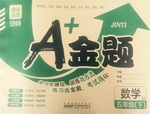题目内容
Our society insists on regular habits, timekeeping and punctuality, and whether we like it or not, ______ we mean to make our way in society, we have to comply ( to act in accordance with a demand, rule, etc.) its demands.
A.whether B.after C.if D.until
C
【解析】
试题分析:此题考查连词:A. whether是否B. after 之后C. if 如果D. until直到,句意:我们所生活的这个社会坚守着一些约定的习俗,守时守规矩。那么,不管我们是不是喜欢这样,如果我们打算要在这个社会中生活下去,那我们就要按照它的要求去做。If引导条件状语从句。选C。
考点:此题考查连词
点评:这句话比较长,也给做题带来了困难,考生先要看清句意,了解上下文的逻辑关系再动手做题,从连词的辨别进行判断,可知这是个条件句。

 A加金题 系列答案
A加金题 系列答案 全优测试卷系列答案
全优测试卷系列答案I remember a day when I was a little kid. I was making a sandwich in the kitchen when I noticed the date on one of the wine bottles.
“ Dad, dad!” I cried. “This wine is too old to drink.”
“ Son, hold on,” he said.
“ No, you can’t drink this tonight! This bottle of wine was made 10 years ago.”
“ Wait, let me tell you…”
“ Would you like me to throw it away from you?” I asked.
“ Son, wait a second,” he said. “Son, some wines get better over time. The longer you wait to drink it, the better it will be. Although this may seem strange, it is true.”
When I was young, I didn’t have any understanding of what this meant, but now, this would have been very helpful to remember as I went through my teenage years.
In our society, we forget this simple rule: The longer you want for certain things, the better they will be. But we want the best job as quickly as possible; we want to graduate from college in as few years as possible; we even speed through our homework just to chat with friends. When we do this, we lose something of great importance.
We all want to get to the next step so quickly that perhaps we don’t get ready enough to get there. This has a negative effect on our society. When trying to go to the right college, we will do anything to get in and when we rush through our class-work, we may not study enough for the test, and end up failing. We need to be ready for whatever comes, ready for the unexpected. Wine gets better over time, so do the things in our paths of life.
【小题1】Why did the author tell his father not to drink the bottle of wine?
| A.Because it smelt terrible. |
| B.Because it was mixed with something else. |
| C.Because his father drank too much that night. |
| D.Because it had been kept for years. |
| A.made the author puzzled when he was a little child. |
| B.was too simple a rule to be meaningful to the author. |
| C.threw the author into deep thought then. |
| D.was an excuse to drink the wine. |
| A.do it better | B.save much time |
| C.graduate from college more quickly | D.miss something useful to us in life |
| A.Well begun is half done. | B.More haste(匆忙), less speed. |
| C.Failure is the mother of success. | D.Nothing is impossible to a willing heart. |